









































|
The Trinity |




|
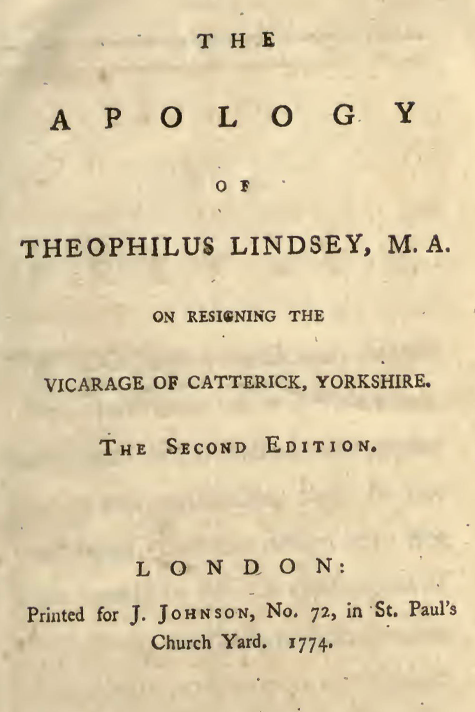

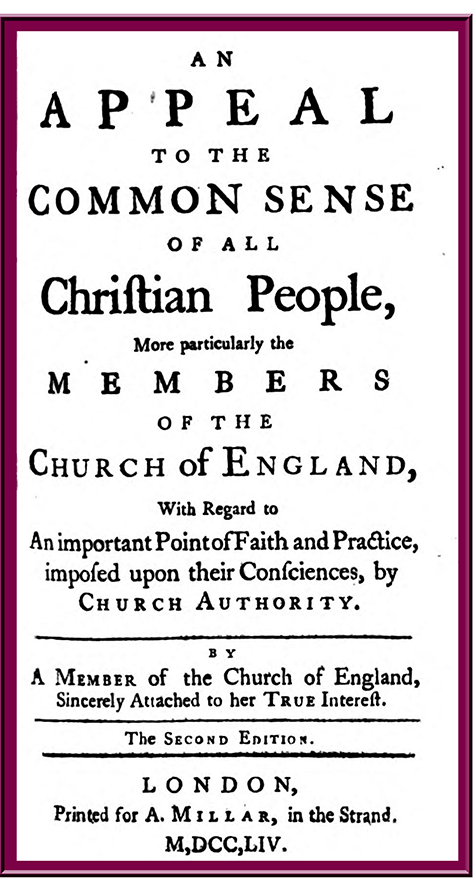
|
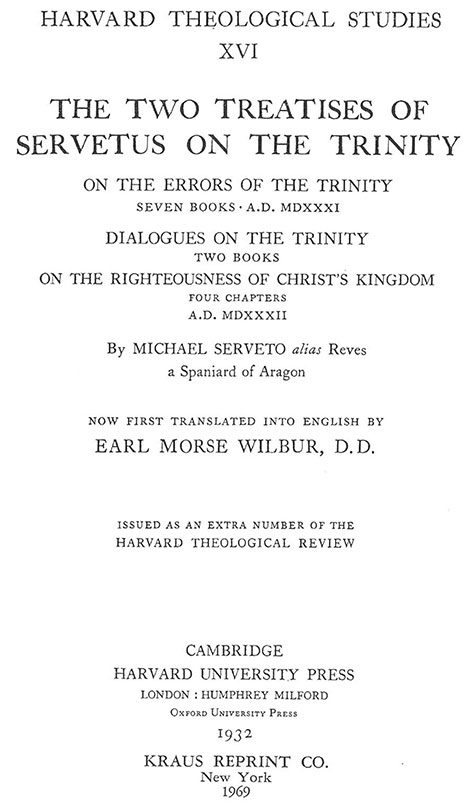
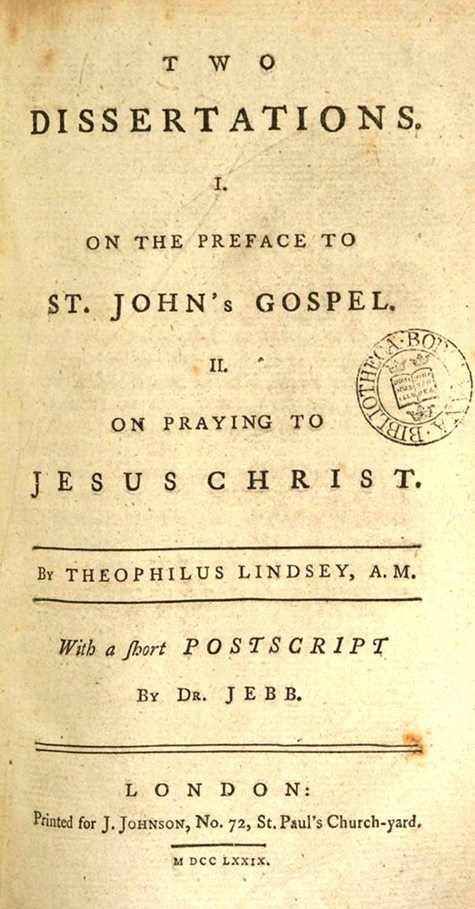

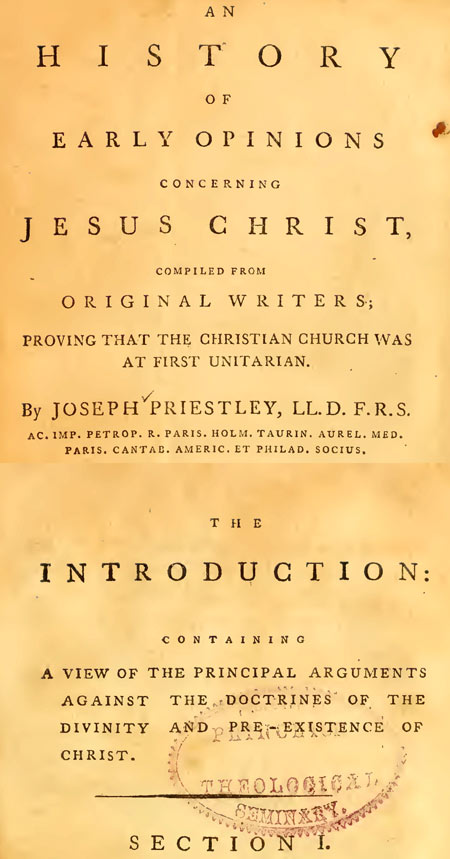
Argument Against the Divinity of Christ
* * * * *
Argument Against the Preexistence of Christ
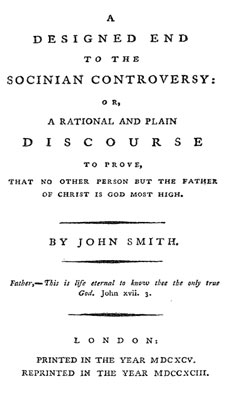
|
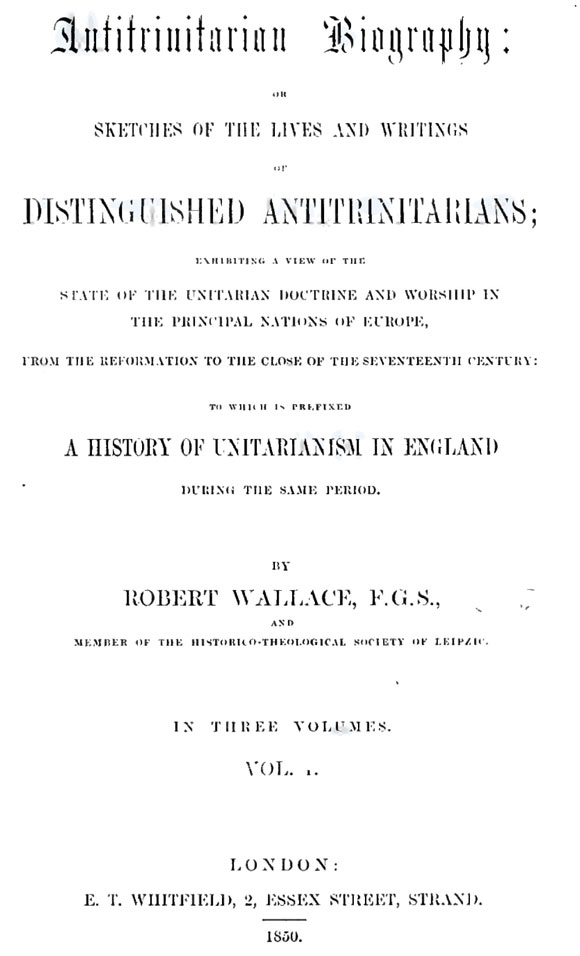
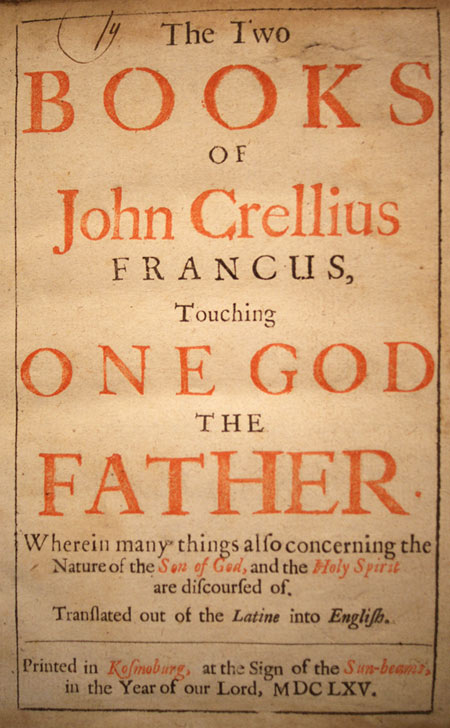
by Matteo Gribaldi
in the year 1554
[Below is an excerpt from the Book, "Declaratio, Michael Servetus's Revelation of Jesus Christ the Son of God." Michael Servetus was burned at the stake by John Calvin in 1553 for writing his Book, 'The Errors of the Trinity.' The author of 'Declaratio,' has been discovered, was not Michael Servetus but was Matteo Gribaldi, an Italian Lawer, who wrote it under a pseudo name
Read Full Article

The Trinity and the Jews
(Reconciling the Jews to Yahoshua & Yahweh)
Concerning the doctrine of the Trinity, a Jew stated, "The foundation of Christian theology includes belief that G-d exists as a Trinity, and that Jesus is the bodily incarnation of G-d and acts as a mediator between G-d and man. Hebrew Christian missionaries claim that this theology is totally compatible with Judaism. Judaism maintains that although certain beliefs may be permissible for non-Jews, they are not acceptable for Jews.
Read Full Article

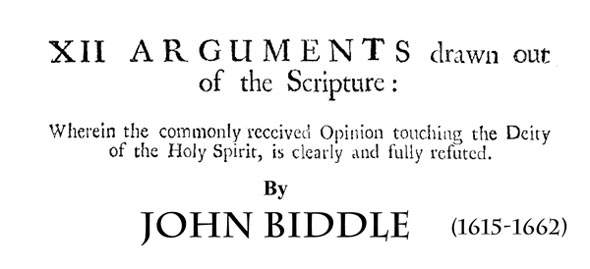
John Biddle Bio (PDF)
XII Arguments drawn out of the Scripture, Wherein the commonly received Opinion touching the Deity of the Holy Spirit, is clearly and fully refuted (PDF)
A Review of the Life, Character and Writings of the Rev. Jon Biddle, M.A.
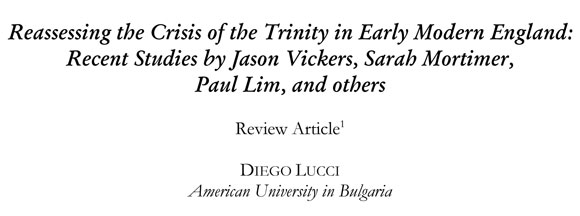
Debates on the Trinity in two crucial periods of English history

Nathaniel Lardner
He has two books available on this website.
They are:
A Letter Writ in the Year 1730 BW
Holy Spirit BW

|
|
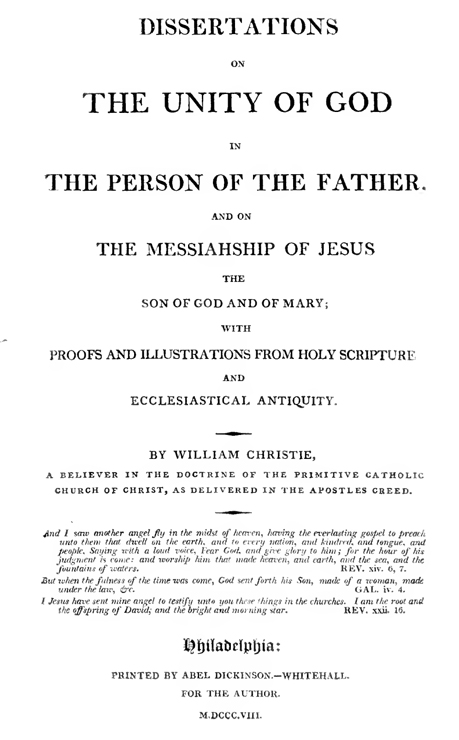
|
|
John Smith (Read his book)
(Taken from the book titled,
"Antitrinitarian Biography Exhibiting a View of the State of the Unitarian Doctrine and Worship by Robert Wallace; pg. 289-295).
At the commencement of the year 1695, an honest tradesman, of the name of John 'Smith, wearied and disgusted, like the author of the Letter to the Clergy.- and many others, with the repeated unsuccessful attempts of the learned to give an explanation of the Trinity which should afford general satisfaction, ventured to draw up and print a short treatise, under the title of " A Designed End to the •Socinian Controversy : or a rational and plain Discourse to prove that no Person but the Father of Christ is God Most High." For reasons which will soon appear, this was not included in the Third Collection of Unitarian Tracts ; and copies of it had become so scarce, that its very title was unknown to the generality of book-collectors at the close of the last century. But the late Michael Dodson, Esq., on turning over a heap of waste paper, happened to cast his eye upon a copy of it, from which, under his superintendence, it was reprinted in 1793, for circulation among the tracts of the London Unitarian Society.* For twenty years after the republication of this rare tract, almost as little was known of the history of its author, as had been previously known of the tract itself. It appeared, indeed, from the title-page, that it was written by a certain " John Smith." 4= But who John Smith was, no one was able to tell. There were doubtless hundreds of that name then, as there are still : but without the aid of any better clue than the bare name of John Smith, the attempt to discover the author, and establish his identity, would have proved utterly vain and fruitless.
At length, in the year 1813, the late J. T. Hutt, Esq., gained some information upon this subject, from an octavo volume, which lie picked up at a book-stall, and of which he gave an interesting account in the " Monthly Repository " for that year. The title-page of this volume was as follows. " A Divine Antidote against a Devilish Poyson, or a Scriptural Answer to an Anti scriptural and Heretical Pamphlet, entitled, A Designed End to the Socinian Controversie, written by John Smith :' answered by Francis Gregory, D. D., and Rector of Hambleden, in the County of Bucks. London, 1696.'1- The following is from the learned Doctor's Address "To the Christian Reader."
"To shake the faith, and stagger the minds of orthodox Christians, touching the doctrine of the glorious Trinity, there came out a little book, which by mere accident I met with. A book stuffed with blasphemous falsehoods, too much magnifying humane reason, abusing the sacred word of God, denying the divinity of Christ, and the personality of the Holy Ghost. What censure its author deserves, let authority judge ; but I will venture to say that the book itself cloth both deserve and need the flames ; for 'tis so abominably foul, that nothing can purge it, save only that which consumes it too. This book was first put into my hand by an eminent citizen of London, [Qu. Mr. Firmin ?] who informed me, that its author is by trade a clockmaker.' This being so, it may be thought a matter of no great credit for a divine of the Church of England to dispute a point of faith against an illiterate mechanic."* On the face of this extract, it would appear as though no notice had been taken, by the civil or ecclesiastical authorities, of the publication of John Smith's pamphlet. But we learn from other sources, as will be seen by and by, that this was not the case.
In the year 1695, Dr. Hickes, the celebrated nonjuring Clergyman, published anonymously, Some Discourses upon Dr. Burnet and Dr. 'Tillotson ; occasioned by the late Funeral Sermon of the former upon the latter," 4to. ; and in No. viii. of the Appendix to these Discourses, we find the following allusion to John Smith's pamphlet. " Besides several libels against the state, many heretical and Socinian books have been seized and stopped, particularly one entitled, A Brief and Clear Confutation of the Trinity,' which was publicly burnt, by order of both houses of parliament, and the author prosecuted ; and one other lately taken with its author, called A Designed End to the Socinian Controversy, or a rational and plain Discourse to prove that no other Person but the Father of Christ is God Most High."* Dr. Hickes, in his Preface, ascribes the prosecution of John Smith to the active vigilance of Archbishop Tillotson,t but probably on insufficient grounds ; for this sturdy non juror is known not to have been over scrupulous, as a writer on subjects, in which his own prejudices were concerned, or his own personal feelings excited. Dr. Birch:: alludes to the " strong and clear answer" of Bishop Burnet to Hickes's "Discourses ;" and to " the many charges of misrepresentation and falsehood" imputed to their author by the Bishop. The following is the title of Burnet's answer. " Reflections upon a Pamphlet, entitled, Some Discourses upon Dr. Burnet and Dr. Tillotson, occasioned by the late Funeral Sermon of the former upon the latter ;' by the Rt. Reverend Father in God, Gilbert, Lord Bishop of Sarum. London, 1696." But in this answer, although some gross calumnies are examined and exposed, not the slightest notice is taken of the one, in which Archbishop Tillotson is charged with persecuting the Unitarians, or of many others of less importance ; the reason of which appears from the following paragraph, extracted from p. 155. " I have left many trifling things without any answer ; not for want of good matter, but from that just tediousness that it gives to a man's self, as well as to his readers, to enter into a long discussion of many trifling stories relating to himself. I have not considered many reflections lie makes on some of my Reverend Brethren, nor these he levels at our Most Reverend Primate; they slew a keenness of spite that can hurt no man but himself, and therefore I pass them over." But, as regards the particular charge now under consideration, it is sufficient to observe, that Archbishop Tillotson died Nov. 22nd, 1694 ; and that the " Designed End to the Socinian Controversy" was not published till the beginning of the year following. Yet, whoever may have instigated the prosecution of John Smith, for the publication of this pamphlet, there is great truth in the following remark of Dr. Ilickes, respecting the Unitarians of those times, that " certainly there must be something formidable in their books, and some reasoning's in them, which these men of latitude cannot well answer, that they use so much diligence to suppress them."
Most of the publications in this controversy, and particularly those on the Unitarian side, were anonymous ; and the authors of the latter so effectually preserved their incognito, that no clue to their discovery is known to exist. It was, therefore, a bold thing for John Smith to announce his name in the title-page of his pamphlet. But he had not anticipated, and was not prepared to meet the consequences of his own rash act. An information was lodged against him in the Spiritual Court ; his book was suppressed ; and, to ward off ulterior measures, he submitted to the humiliating act of signing a recantation. The documents. by which this fact is attested, were brought to light by Mr. Rua, in 1829. That gentleman discovered them among Bishop Kennet's Collections " in the Lansdown Mannscripts,4' and made them public through the medium of the " Monthly Repository" for that year.- But as the attention of some will probably be directed to this account, who may not have access to that work, a copy of these curious documents is subjoined.
Jan. 23, 1694.
Whereas I, John Smith, Citizen of London. presuming too far upon my private reason and understanding, have lately compiled, and rashly against my duty Bette forthe a book entitled, A Designed End to the Socinian Controversy, &c.,' printed in the year 1694, and thereto, with unusual confidence have set my name, in which book I have undertaken to assert, maintain and prove several points in divinity, contrary to the Articles of Religion commonly called the Thirty-nine Articles of the Church of England, and contrary to the established laws and statutes of the realm,—I, John Smith, do hereby declare. that I am very sorry for the same, and wish, with all my heart, I had not either written, or caused to be printed, the said book, asking forgive-ness of all such as have been hurt thereby, or justly scandalized thereat, and retracting all pernicious errors and heretical positions contained in the said book. And I do hereby promise, with sincerity and truth, to abstain from all occasions of falling into the like miscarriage as much as in me lies, and to behave myself, for the time to come, as befits an humble, peaceable, modest, and quiet Christian. In witness whereof, I have hereunto set My hand, &c.,
" JOHN SMITH."
It will be seen, that the date of these documents is January 23rd, 1694 ; but, according to the mode of dividing the year which then prevailed, from the 1st of January to Lady-day was considered as belonging to the preceding year, so that their proper date, according to our present mode of reckoning, would be January 23rd, 1695.
Read his book
The Trinity and the Jews
(Reconciling the Jews to Yahoshua & Yahweh)
Read the PDF Version
Concerning the doctrine of the Trinity, a Jew stated, "The foundation of Christian theology includes belief that G-d exists as a Trinity, and that Jesus is the bodily incarnation of G-d and acts as a mediator between G-d and man. Hebrew Christian missionaries claim that this theology is totally compatible with Judaism. Judaism maintains that although certain beliefs may be permissible for non-Jews, they are not acceptable for Jews. The Christian theology concerning G-d is one example of a belief that is absolutely forbidden to Jews according to the Hebrew Bible, as the following biblical sources demonstrates: “Hear O Israel, The Lord our G-d, the Lord is One.” (Deuteronomy 6:4)." If, on the day of Pentecost, the Jewish apostles had taught the man-made doctrine of the Trinity to their Hebrew brothers and sisters, there would not had been about 3,000 Jewish souls immersed in the name of Yahoshua Christ! Neither would there been, days later, an additional 5,000 Jewish souls believing the apostles Glad-Message. Why? Because the Shema, the Great Commandment would have been broken! This article is designed to reach the Jewish population, showing them that I agree with them that the doctrine of the Trinity is an abomination to Yahweh. (I know saying Yahweh is a no, no but get over it, this is a Jewish superstition. Yahweh loves his name!) Our lesson should be that King Solomon should not had listened to his foreign wives; Christians should not listen to the Church Fathers and theologians and the Jews should not listen to their rabbis but all followers of Yahweh should be founded only upon the Word of Yahweh (Old & New Testament), as recorded in the Hebrew text and secondarily in the Greek text. Hebrew (including Aramaic, Daniel etc.) is the language of all the prophets.
Pagan Gentile Christians started the pagan doctrine of the Trinity, which is not part of the Word of Yahweh, but rather is absolutely contrary to it's contents. One would not judge Judaism by focusing on the end of King Solomon's life, whom Yahweh appeared to twice, when he also created pagan doctrines for the Jews, by worshipping the gods of his wives. Christians, instead of reading only the Word of Yahweh, read incorrect Bible translations and commentaries of the Church Fathers, which are full of pagan doctrines. The Jews practice this same error by reading the Talmud, Midrash and Mishnah, rather than reading only the Tanakh and then the correctly translated New Testament. Christianity and the Trinity are not one and the same although it does permeate the Roman Catholic and Protestant Church. Many famous individuals, who have bowed to Yahweh, have refused to bow to this man-made idol, such as Isaac Newton, John Locke, Michael Servetus, Presidents John and John Quincy Adams, V P Wierwille, to name only a few. The apostles of Yahoshua were all Hebrews. They did not teach God the Father, God the Son and God the Holy Ghost but rather, "Ye men of Israel! hear these words:—Yahoshua the Nazarene, a man pointed out of Yahweh unto you by mighty works and wonders and signs, which Yahweh did through him in your midst, just as ye yourselves know, The same, by the marked out counsel and foreknowledge of Yahweh given up, through the hands of lawless men, suspending, ye slew, Whom, Yahweh, raised up, loosing the pangs of death, inasmuch as it was, not possible, for him to continue held fast by it. For, David, saith concerning him—I foresaw Yahweh before me continually, because he is, on my right hand, that I may not be shaken...The same Yahoshua, hath Yahweh raised up, whereof, all we, are witnesses! By the right hand of Yahweh, therefore, having been exalted, also, the promise of the holy ruah, having received from the Father, He hath poured out this which, yourselves, do see and hear...Assuredly, then, let all the house of Israel know: that, both Lord and Messiah, hath Yahweh made him, even the same Yahoshua whom, ye, crucified" (Acts 2:22-36)! Also it is written, "That Yahweh hath fulfilled, the same, for our children, by raising up Yahoshua: as also, in the second psalm, it is written—My son, art, thou: I, this day, have begotten thee" (Acts 13:33).
Matteo Gribaldi, a follower of Yahweh, a famous lawyer from Italy, who spoke against the doctrine of the Trinity, as did Michael Servetus, who was burned at the stake by John Calvin for writing the Errors of the Trinity, wrote in the 1500's, "Which Jews have they won over to Christ, during the last thousand years or more? The apostles, however, converted many thousands of Jews in one day by their straightforward preaching of one God the Father and his only begotten son, Christ Jesus crucified. The number of believers, from among the Gentiles as well as the Jews, daily multiplied and increased wondrously! However, they were not then preaching about three gods or hypostases, nor about two sons. What Jew could ever have believed in such triplication of divinities — or, in truth, this Cerberus — or could believe in it now? For the Jews realize that they ought to worship, in the simplest way, only one eternal, invisible God, the creator of all things. Thus they rightfully throw this multiplicity of gods in our faces and scoff at it. For then the Jews heard from the apostles about only one God, the Father, and only one Son of God, Jesus Christ, who died for the redemption of Israel and was resurrected and glorified. They easily understood this faith, and would also understand it now and be converted, if today's theologians proclaimed that faith and religion as the apostles did, most simply and purely, in the early days. Nor do I doubt that all the heresies and contentions among Christians would cease if they had a correct understanding of Christ, the Son of God." Matteo affirmed the Shema, Deuteronomy 6:4-5, by saying, "Hear, O Israel: Yahweh, is our Elohim,—Yahweh is one. Thou hast therefore love Yahweh thy Elohim,—with all thy heart, and with all thy soul, and with all thy might."
Excerpts from Jews on the subject of the Trinity and my reply:
1.) "The controversies between the Christians and the Jews concerning the Trinity centered for the most part about the problem of whether the writers of the Old Testament bore witness to it [Trinity] or not, the Jews naturally rejecting every proof brought forward by their opponents." This is correct because the Old Testament does not bear witness to this doctrine.
2.) "Yahweh's absolute Oneness: The commandment to believe in Yahweh's absolute Oneness was given specifically to the children of Israel (the Jewish people). The concept expressed in this verse (Deuteronomy 6:4) not only refutes the plurality of Gods, but also asserts that Yahweh is the only true existence." This statement is true.
3.) "He was not descended from the House of David. According to Jewish law, tribal identification comes from the father's side." Yahoshua, according to the Gospel of Matthew, was of the seed of David, through his mother Miriam (Mary), whose father, Joseph, was the seed of David; "And Jacob begat Joseph, the father [aner] of Miriam [Mary], of whom was born Yahoshua,—who is called Christ" (Mt. 1:16). It is also interesting that David came through two women, that have be duly noted in Matthew 1:3,5, Tamar and Ruth. Also, if Yahoshua was Yahweh, as the doctrine of the Trinity teaches, he could not be the seed of David. Yahoshua could not exist, except in the mind of Yahweh, before David, him being David's seed, meaning Yahoshua's existence began when he was conceived in Miriam's (Mary) womb. He did not, 'Preexist,' as is falsely taught.
4.) "Christianity believes that God [Yahweh] came down to earth in human form, as Jesus." The New Testament does not teach this doctrine.
5.) "In Jewish law, worship of a three-part god is considered idolatry; one of the three cardinal sins for which a person should rather give up his life than transgress. The idea of the trinity is absolutely incompatible with Judaism." I agree, the idea of the trinity is idolatry!
Yahoshua, the Son of Yahweh, is the Messiah. The false doctrines that many Christians produce should not be an excuse for disobeying Yahweh. The false doctrines of the Jewish King Jeroboam (two calves), even though he was anointed by Yahweh, was no excuse for the followers of Yahweh to depart from Yahweh because of Jeroboam's false representation of the Torah. Every Jew is responsible for reading the Old & New Testament. Yahweh will hold everyone, who has access to these books, accountable to obey his recorded word. It is written, "Yahoshua saith unto him—I, am the way, and the truth, and the life: No one, cometh unto the Father, but through me" (Jn. 14:6); "Who, is the False One; -save he that denieth that, Yahoshua, is the Messiah? The same, is the Antichrist,—he that denieth the Father and the Son. Whosoever denieth the Son, neither hath he, the Father: He that confesseth the Son, hath, the Father also" (1 Jn. 2:22-23).
Yahoshua, the Messiah, the son of David, the tsemach, will be ruling the New Earth for 1,000 years, thereafter, the defilement of death will be removed from the earth (Rev. 20:14), which prepares the way for Yahweh to come to reign age-abidingly upon his New Earth, which has no need of the sun, because he is the light thereof (Rev. 20-22). If you will not bow down unto the Messiah, then you will have no part in the New Earth but will be destroyed. The excuse, that you did not bow to Yahoshua as your Messiah because the Christians taught the abominable doctrine of the Trinity or what your rabbi taught you or what was written in the Talmud, etc. etc. will not justify your rebellion against Yahweh. Yahweh proclaimed in 1 Chronicles 28:9 "Thou, therefore, Solomon my son, Know thou the Elohim of thy father, and serve him with a perfect heart and with a willing soul, for, all hearts, doth Yahweh search, and, every devised purpose, doth he understand,—If thou seek him, He will be found of thee, but, if thou forsake him, He will cast thee off for ever." Seek Yahweh by putting away all outside literature and read the New Testament in Rotherham's Emphasized Bible. The One Adon [Lord] (1 Cor. 8:6), the Messiah Yahoshua and the One Elohim, Adonai Yahweh Elohim of Hosts will reveal themselves to you, thereby dwelling in you, filling you with the promise of Joel, ruah ha qodesh (holy spirit), enabling you, your sons and your daughters to prophesy, dream dreams and see visions, if you will bow your knees to Christ Yahoshua, your Passover Lamb, making him your Master!
(For footnotes, read PDF version.)
(When quoting scriptures, from the Rotherham Emphasized Bible New Testament, I will substitute the Hebrew words
Yahoshua (yeh-ho-shoo’- ah) for Jesus, Yahweh and Elohim for God and the LORD and ruah for pneuma (spirit).)
***********************************
The Trinity Rebuked by Matteo Gribaldi
in the year 1554
Read the PDF Version
[Below is an excerpt from the Book, "Declaratio, Michael Servetus's Revelation of Jesus Christ the Son of God." Michael Servetus was burned at the stake by John Calvin in 1553 for writing his Book, 'The Errors of the Trinity.' The author of 'Declaratio,' has been discovered, was not Michael Servetus but was Matteo Gribaldi, an Italian Lawer, who wrote it under a pseudo name. This excerpt is from Book four, pages 95 to 109. To understand this excerpt, one must understand it is from the middle of his book and also that Matteo's usage of the word, God, is the meaning of the Hebrew word, elohim. One must also realize that during the 1500's, it was a capital offense if one rejected the Trinity, so Matteo, in the most part, is moderate in his writing. I highly recommend this book, which is a great treasure of history, even though it has some errors because the premise, One God and One Lord, is true.]
You will easily learn from the Old Testament the kind of deity that is in Jesus Christ, if you pay close attention to which Hebrew word is used when Christ is called God. You will also be able to comprehend the clear difference between the proper name of God the Father, who alone is God, by himself and by nature (Galatians 4),a and the other names that are given to Christ, who is God by means of grace or a nature freely given by the Father. For when Thomas called Jesus his Lord and his God, he did not say Jehovah, but Adonai [Lord] and Elohim [God]!' Similarly, speaking of the Son of God in Hebrews 1, the Apostle says Elohim. According to the meaning of the word Elohim, to say that he became God over us means nothing A other than that he became our Lord, our king, and our judge.
Indeed, the name Elohim signifies the power and superiority of God. Therefore, the name God is truly appropriate to Christ, since the Father anointed him king and Lord, and gave him rule over all creatures. For kingship and all judgment and all power in heaven and on earth was bestowed on him. Did not scripture also call King Cyrus, who was a type of the true Christ (that is, the King), Elohim, the God of Israel (Isaiah 45): "I will give you hidden treasures, he said, that you may know that I am the God who View your name, the God of Israel." Similarly, God made Moses a God to Pharaoh because of the power and superiority which God had given him over the Pharaoh. Therefore, the name God is far more suited to the Son, Jesus Christ, whom the Father raised above all creatures, and filled with all power, divinity, grace, and blessedness. For this reason Isaiah says: He will called Mighty God and Emmanuel, which means, God with us.
The theologians, however, who think so impiously and unjustly about the human nature of Christ, do not consider that this, which was folly to Gentiles and a stumbling-block to Jews, was the most excellent of all the works God performed: that God wished to bring forth from his Word a human being as his Son — visible, capable of suffering, and subject to death — to raise him up above all creatures, and, in all glory and sublimity, place him at his right hand, making all things subject to him. Christ the consummation and fulfillment of all the works and plans of God the Father. He was our visible Lord and God, through whom and by whom all things were made.
However, even this is insufficient for a complete knowledge of Christ. For this you must come to understand the mysteries of the Word, and become acquainted with that most holy man Jesus, the Son of God. Before all the ages and from eternity, he was already God with God the Father, to whom all things are eternally present. In the unchanging light of his eternity, he sees and arranges, as already accomplished, those things which, among us in time, were, are, or will be. A thousand years with him are but as an outward day when it is past. Thus, the Word, or Logos, of God, which was Christ, predestined before all creation, was with the Father, as John relates, and was "true God of true God." We will discuss this at greater length below.
Thus in Hebrews 1 the Apostle calls Christ Elohim. Indeed, according to tradition, Solomon is also called Elohim (this passage is taken from Psalm 44). The Apostle does not, however, place the force of his argument on the word Elohim, but on the statement that his throne and kingdom are for ever and ever. For, from the word Elohim alone, he could not have proved Christ greater than other rulers of the earth or angels, since even they are called by the same name and are called gods [Elohim] by the Prophet! Similarly, where it says, Let all the angels worship him or You have made him a little lower than the angels, in both places Elohim is used.
Therefore, I believe that you can now see more clearly how, in so serious and fundamental a matter, ignorance of Hebrew phraseology has so wildly deceived Greek philosophers that they have not been able to distinguish the different names for divinity, both Father and Son. They say that they think of persons and subsistences as one and the same God, thereby confusing the nature and substance of the Father and the Son. However this is contrary to the meaning of the Apostle, who, in Hebrews 1, says clearly that the Son is the splendor of the glory and the very stamp of the substance of God. Also, in Colossians 1, he calls the Son the visible image of the invisible God.
Thus, in order to convey the difference between Jesus Christ and other, partial gods, since he is the Son and heir, and, by a nature freely given, God, Christ is also called God of all the earth, great God, true God, mighty God, wonderful, and blessed above all things.
Due to the dearth of divine names in Greek, the apostles could only express divinity to the Greeks by using the word theos [god]. Nevertheless, when speaking of Christ, they use this word very rarely, almost always employing the word kyrios [Lord]. For in Scripture the Father is called God, and the Son, Lord. All this needs to be considered carefully. For the Greeks would not have caused us so much trouble if they had learned Hebrew.
Now, therefore, you can clearly judge the source of the Greeks' pernicious error about the triad or three hypostases forming one God — and also their creating three separate persons out of one God, not to mention communicatio idiomatum, two natures and two sons, connotative supposita, aggregates, and similar nonsense, about which the apostles never gave a thought, and concerning which there is not even a single jot in all of scripture. Indeed they are ignorant of the meaning of the words for God and of the various divine names in the Hebrew language. Because they see that in scripture Christ is sometimes called God — although there is only one God that we should worship — they are compelled to establish three persons or hypostases in one deity and to maintain that one of them is Christ.
A greater consequence is that they are compelled make two Christs and two sons, one of whom is the Son of God and the other the Son of man, one visible and capable of suffering, the other invisible and incapable of suffering. Furthermore when scripture calls Christ, "God: they understand this to mean an invisible being who is not a man, thus denying that Jesus Christ, our redeemer and the head of the church," the one mediator between God and men, is the Son of God and God, when, nevertheless, the whole of scripture says and expresses nothing more clearly. Is it perhaps because they are afraid of creating two gods, even though, with their triad, they are in effect foisting on us three gods, equal in nature? And yet, contrary to all reason, they accept that one god can command the other, and that one can be sent forth by the other, not understanding that dominance and superiority do not happen among equals, that decisive action does not arise from an equality of power, and that, in combination, equals would impede one another. Because of this, one must admit that all things originate in one pure and simple God, who is the Father, by virtue of his own will the founder of all that is, who willingly begot the Son. All things obey and are subject to him, even the Son himself, as the Apostle plainly testifies (Corinthians 8 and 15).
Observe, therefore, how a small error at the outset of a teaching or doctrine grows more powerful until it leads to a great many blasphemies and impieties. How much better and more faithful would it have been if they had propounded, based on scripture, a pure and simple faith in only one God, the Father, who alone is God by nature, infinite, invisible, and unchanging, God of all gods, who dwells in inaccessible light; and in the true and natural Son of this one God, the Lord Jesus Christ crucified, the Word of God incarnate, made visible and capable of suffering, visible God from invisible God, who was required to suffer in order to fulfill every plan, decree, and purpose of the Father, and to achieve his glory to the fullest degree in triumphant victory over all his enemies. This is our true God, the beloved Son, in whom the Father was well pleased, and on whom he bestowed as much grace, might, spirit, power, honor, and divinity, as the most omnipotent Father is capable of giving and conveying to his most loved and only begotten Son, so that all our hope and faith might be in him, and to him let there be all praise, honor, glory, and blessing for ever and ever. Amen!
This is the true, pure, simple and genuine Christian doctrine. This is the unadulterated proclamation of the holy gospel set forth most plainly in all of scripture, in both the Old and New Testaments. The prophets did not proclaim, the apostles did not preach, nor did the martyrs preserve with their blood any faith or doctrine other than this. You, indeed, pious and faithful Christian, you who follow the authority of no man and swear by the words of none, but seek rather to obey the simplicity of spirit of genuine scripture, weigh carefully, I beseech you, and, setting aside all outside influence, diligently consider in your heart which doctrine of religion seems to you truer, purer, more authentic, clearer, and more in line with the gospel of Christ: the one which I have just set forth, about one God the Father and the only Son of that same God, the Lord Jesus Christ crucified, or the one which Greekish philosophy — utterly unknown to the Hebrews—has for so long been forced upon you, in so many volumes and commentaries, about three persons or hypostases, two natures and two sons, the communicatio idiomatum and connotative supposita, without which they say that the mysteries of Christ cannot be rightly understood nor the gospel soundly proclaimed.
0 Christians, how miserable you are, if you are compelled to accept an empty and deceitful Greek philosophy—which the Hebrews, Scythians, Turks, and infidels of every kind rightfully ridicule and mock — in place of the genuine faith, the holy utterances of God, and the untainted gospel of Jesus Christ. Let the philosophers produce, from anywhere in scripture, even a single speck of support for their sophistical pronouncements. Did Paul, the chosen vessel, who left out nothing pertaining to the revelation of the true faith and the Christian religion, at any time even so much as mention hypostases or natures, or such a thing as cornmunicatio idiomatum? He was totally unfamiliar with such things. And if Paul was unfamiliar with them, who, of all mankind, knew about them? See how rapidly this entire chimera, which no one has ever been able to understand or explain, evaporates!
If a spirit eager for the gospel truth, wishing to distentangle the mystery — or, more correctly, the philosophy — of this triad, asks some eminent person to explain it to him, he immediately hears that he should inquire no further about so arcane and abstruse a mystery. Augustine spent nearly his entire life investigating and trying to explain the triad but was unable to make any progress. For that reason, we are told that we must restrain our intellects and not trouble ourselves any more about the matter, lest we should be overcome by vainglory. Instead, we are instructed simply to follow the faith of those holy fathers and theologians who have handed these things down to us, and not to pursue any further investigation.
What a ridiculous kind of piety! And why have these eminent persons not also sought out the truth, and more carefully investigated the teachings of the church fathers on prayer, purgatory, the Eucharist, free will, the invocation of the saints, and other traditions of this kind? If only the fathers had told the truth! For then the Christian religion would never have needed to have written anything about or investigated this metaphysical triad. Did not Paul do well to forewarn Christ's faithful not to pay heed to philosophy or to listen to strange new expressions, nor to permit themselves to become entangled and led astray by such sophistical nonsense? Unfortunately, however, shortly thereafter, this is precisely what occurred, to the grave detriment of the entire Christian religion.
Tell me how Christianity has ever grown or been strengthened by the preaching of such sophistries. Which Jews have they won over to Christ, during the last thousand years or more? The apostles, however, converted many thousands of Jews in one day by their straightforward preaching of one God the Father and his only begotten son, Christ Jesus crucified. The number of believers, from among the Gentiles as well as the Jews, daily multiplied and increased wondrously! However, they were not then preaching about three gods or hypostases, nor about two sons. What Jew could ever have believed in such triplication of divinities — or, in truth, this Cerberus — or could believe in it now? For the Jews realize that they ought to worship, in the simplest way, only one eternal, invisible God, the creator of all things. Thus they rightfully throw this multiplicity of gods in our faces and scoff at it. For then the Jews heard from the apostles about only one God, the Father, and only one Son of God, Jesus Christ, who died for the redemption of Israel and was resurrected and glorified. They easily understood this faith, and would also understand it now and be converted, if today's theologians proclaimed that faith and religion as the apostles did, most simply and purely, in the early days. Nor do I doubt that all the heresies and contentions among Christians would cease if they had a correct understanding of Christ, the Son of God.
But wondrous are the judgments of God the Most High. He did not allow so great an error to spread for no reason. (And there are other errors, by no means trivial, which also persist in the church to this day.) Otherwise, we would not see the Mohammedan sect, so impious, false, and abominable, prowling about and gaining strength throughout the world. For only God and the palpable Word of God are true; every man is false God has confined everyone in error and sin, so that all may be judged by the Son, who alone is the Truth of the Father. The wise have become fools, because they follow their own contrivances, seeking their own glory, not the glory of God. Thus they are found to be like chaff without wheat.
I will now decisively turn the argument about a plurality of gods against the theologians. They set up three persons, distinct in being and number, while not granting, according to the meaning of the Latin word persona and that these persons are qualities or dispositions of one God. Instead, they say that there are three "subsistences," which, in Greek, they call "hypostases"— certainly an uncommon word, although one quite familiar to physicians.
But although they wish each of these persons or hypostases to be God, they nevertheless say there is only one God, one nature, and one substance. For they propose to us three distinct subsistences and want to persuade us that these are all a single substance. I do not see from what source they have derived this subtle distinction between substance and subsistence. They likewise presume three entities or three existing beings, and say that they are one nature, so that, in effect, they want one to be three and three, one. What mind could understand this?
They want "God," which is a substantive and appellative noun, to be predicated equally of three substances, distinct in being and number. Let us see if they can vanquish this chimera! As Lorenzo Valla, a man preeminent in all disciplines, especially in sacred literature, has also rightly judged, they have in effect set up three gods, equal in nature. In book 6 of De Elegantiis, chapter 450, where he writes about persona and its proper meaning, he argues against Boethius, saying that those who wish persons to be not qualities, but substances, should consider the possibility that they have thereby set up three gods, which is doubtless both impious and blasphemous.
Having, therefore, cast aside such sophistical inventions, let us examine those arguments that offer a solution. Let us say that Jesus Christ is God in the way that he revealed himself as God to the Jews who rebuked him. Let us not seek any other teacher or interpreter. When pressed about his divinity, he did not deny that he was God. But clearly, due to the generous gift of superabundant grace, Christ, unlike other earthly men and partial gods, is the Son, and, by his freely-given nature, God. This grace was given to him in a greater degree than it was given to all the others who were chosen by God and divinely illumined, whom scripture calls gods.
Besides, although Christ is God, he is nevertheless one with God the Father in a unity of spirit, will, and love. Thus, the plurality which theologians see is not there, but rather results if, as they would have it, there are two or three gods equal in nature. In that case, as we have shown above, it would be impossible for one of them to be dispatched or sent forth by the other.
On the other hand, Christ is truly God because of the nature of the divinity shared with him by the Father. Thus, the nature of the divinity in Christ and the Father is one and the same. So, in effect, he can be called one God with the Father. For, no matter how you look at it, no greater unity can be found than that of the Father and the Son, even though they are distinct in being and nature. This is why Christ said, "I and the Father are one"; "who sees me sees also the Father:" "the Father is in me and I in the Father": "the Father who dwells in me, he does the works." This being the case, there is no cause for wonder, for since the Son is the visible image of the invisible Father, all the power and spirit of God the Father shines forth in the visible Son Jesus Christ, and thus we recognize, from his wondrous deeds and words, that the Father is in the Son. This is the unity about which scripture speaks. It does not, however, speak about a unity or identity of nature, as the theologians have erroneously taught.
Read and examine all of scripture. You will never find that "Son of God," naturally understood, means the same thing as God. Instead you will find that "Son of God" is always used for one who is distinct in being and nature from the eternal, invisible God. Of course, the Father alone in his very self and nature is the eternal, invisible, and unchanging God. He was never a Son, never begotten, never a man, never sent, never suffered, never seen, never dead and restored to life, but has ever remained the same, eternal, invisible, incomprehensible, and unchanging. It is a terrible blasphemy to say or think otherwise. However, the Son of God was truly a man, truly begotten, truly born, truly sent, truly seen and touched, truly suffered, died and was restored to life. To believe and to confess this is eternal life. Let those tritoites [tritheists], therefore, contrive for themselves as many gods, equal in nature, as they like. For us, as for Paul, one God is enough: the most high and invisible Father, from whom all things are and in whom we are, and one Lord Jesus Christ, our redeemer, through whom all things are and through whom we exist: who is the blessed Son forever.
(For footnotes, read PDF version.)
***************************
Nathaniel Lardner D.D. (1684-1768)
Nathaniel Lardner was a dissenting English minister who devoted his life to the scriptures, Lardner’s objective may be explained in his own words: "Search the Scripturres. For in them Ye think Ye have eternal Life. And they are they, which testify of me" (Jn. 5:39).
His book, addresses the doctrine of the Trinity, there being One God and One Lord. Do not let the title of his book discourage you, the title being, "A Letter Writ in the Year 1730, Concerning the Question, Whether the Logos supplied the Place of a human Soul in the person of Jesus Christ."
The Postscript in this book, which has been separated for your benefit, is titled, 'The Explication of those Words, the Spirit, the Holy Spirit, and the Spirit of God, as used in the Scriptures,' which is an excellent work. Enjoy!
Read the PDF of: A Letter Writ in the Year 1730 BW
Read the PDF of: Holy Spirit BW
***************************
|

